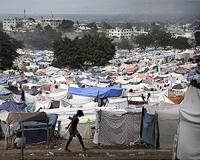| . |  |
. |
West Lafayette IN (SPX) Feb 22, 2010 Several Midwestern states could be facing increased winter and spring flooding, as well as difficult growing conditions on farms, if average temperatures rise, according to a Purdue University researcher. Keith Cherkauer, an assistant professor of agricultural and biological engineering, ran simulation models that show Indiana, Illinois, Wisconsin and Michigan could see as much as 28 percent more precipitation by the year 2070, with much of that coming in the winter and spring. His projections also show drier summer and fall seasons. "This was already a difficult spring to plant because of how wet it was. If you were to add another inch or so of rain to that, it would be a problem," said Cherkauer, whose findings were published in the early online version of the Journal of Great Lakes Research. "It could make it difficult to get into fields. There's also a potential for more flooding." Cherkauer used three different scenarios based on the amount of carbon that could be emitted into the atmosphere in the coming decades. Carbon calculations were based on assumptions including population, technological advancements, the economy and other factors. Those scenarios were used in two climate projection models from the Intergovernmental Panel on Climate Change that give climate predictions from the years 1950 through 2099. Cherkauer said in years from 1950 to 2007 where actual climate data differed slightly from projections, the difference was subtracted to give a better projection for the future. He calculated that winters in the four states could be between 2.7 degrees to 5.4 degrees Fahrenheit warmer by 2077 than today. Summers could be between 3.6 degrees and 10.8 degrees Fahrenheit warmer. Those projections were then put into the Variable Infiltration Capacity Model - which simulates how precipitation moves through land surface environments - to predict stream flow for six rivers: the Chippewa River, Wisconsin River, Illinois River, Wabash River, Grand River and Rock River. Cherkauer estimates that increased precipitation would result in about a 20 percent increase in peak and mean flows for the Wabash River, for instance. Daily river flow would be lower during the summer and fall despite an expected increase in thunderstorms and heavy-rain events. Overall precipitation would be down in those seasons, he said, and heavy rains from time to time would still leave prolonged periods without precipitation. "This area is not going to be short of water, but we may not have it at the right times," Cherkauer said. "We probably need to figure out how to store the excess water from the spring so we have it in the summer when we need it." He said there are several possible avenues for storing spring water, from damming rivers to create reservoirs, to refilling aquifers that are pumped for water in the summer. Cherkauer said next he wants to study how climate predictions would affect drought conditions, as well as how the projections on stream flow would impact aquatic life and ecology. NASA funded his research. Cherkauer's work is affiliated with the Purdue Climate Change Research Center and the Center for the Environment in Discovery Park.
Share This Article With Planet Earth
Related Links Purdue Water News - Science, Technology and Politics
 Homeless Haitians line up before dawn for tarps
Homeless Haitians line up before dawn for tarpsPort-Au-Prince (AFP) Feb 14, 2010 Desperate Haitians began lining up well before dawn on Sunday for tarpaulins distributed to those left homeless by last month's earthquake, although many said they needed tents instead. With the coming rainy season threatening to worsen already squalid conditions in makeshift camps across the capital, aid organizations have been seeking to distribute tarps for up to 1,500 families per day. ... read more |
|
| The content herein, unless otherwise known to be public domain, are Copyright 1995-2010 - SpaceDaily. AFP and UPI Wire Stories are copyright Agence France-Presse and United Press International. ESA Portal Reports are copyright European Space Agency. All NASA sourced material is public domain. Additional copyrights may apply in whole or part to other bona fide parties. Advertising does not imply endorsement,agreement or approval of any opinions, statements or information provided by SpaceDaily on any Web page published or hosted by SpaceDaily. Privacy Statement |